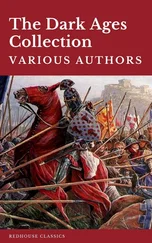The autocracy brought no change in the principle of succession to the throne. Down to its fall in the fifteenth century the Empire remained elective, and the election rested with the Senate and the army. Either the Senate or the army could proclaim an Emperor, and the act of proclamation constituted a legitimate title. As a rule, the choice of one body was acquiesced in by the other; if not, the question must be decided by a struggle. Any portion of the army was considered, for this purpose, as representing the whole army, and thus in elections in Constantinople it was the troops stationed there with whom the decision lay. But whether Senate or army took the initiative, the consent of the other body was required; and the inauguration 5of the new Emperor was not complete till he had been acclaimed by the people. Senate, army, and people, each had its place in the inaugural ceremonies.
But while the principle of election was retained, it was in actual practice most often only a form. From the very beginning the principle of heredity was introduced indirectly. The reigning Emperor could designate his successor by appointing a co-regent. In this way Augustus designated his stepson Tiberius, Vespasian his son Titus. The Emperors naturally sought to secure the throne for their sons, and if they had no son, generally looked within their own family. From the end of the fourth century it became usual for an Emperor to confer the Imperial title on his eldest son, whether an adult or an infant. The usual forms of inauguration were always observed; but the right of the Emperor to appoint co-regents was never disputed. The consequence was that the succession of the Roman Emperors presents a series of dynasties, and that it was only at intervals, often considerable, that the Senate and army were called upon to exercise their right of election.
The co-regent was a sleeping partner. He enjoyed the Imperial honours, his name appeared in official documents; but he did not share in the actual government, except so far as he might be specially authorised by his older colleague. This, at least, was the rule. Under the Principate the senior Imperator distinguished his own position from that of his colleague by raising to himself the title of Pontifex Maximus. Marcus Aurelius tried a new experiment and shared the full sovranty with Lucius Verus. This division of the sovranty was an essential part of the system of Diocletian, corresponding to the geographical partition of the Empire which he introduced. From his time down to A.D. 480, the Empire is governed by two (or even more) sovran colleagues, who have all equal rights and competence, and differ only in seniority. Sometimes the junior Emperor is appointed by the senior, sometimes he is elected independently and is recognised by the senior. Along with these there may be co-regents, who exercise no sovran power, but are marked out as eventual successors. Thus the child Arcadius was for nine years co-regent with the Emperors Valentinian II and Theodosius the Great. No formal title, however, raised the sovran above the co-regent, though the latter, for the sake of distinction, was often called “the second Emperor,” or if he was a child, “the little Emperor.” 6When towards the end of the fifth century the territorial partition of the Empire came to an end, the system of joint sovranty ceased, and henceforward, whenever there is more than one Augustus, only one exercises the sovran power. 7
But the Emperor could also designate a successor, without elevating him to the position of co-regent, by conferring on him the title of Caesar. This practice, which since Hadrian was usual under the Principate, 8and was adopted by Constantine, is not frequent in the later Empire. 9If the Emperor has sons, he almost invariably creates his eldest son Augustus. If not, he may signify his will as to the succession by bestowing the dignity of Caesar. The Emperor before his death might raise the Caesar to the co-regency. 10If he died without having done this, the Caesar had to be elected in the usual way by the Senate and the army. This method of provisional and revocable designation was often convenient. An Emperor who had no male issue might wish to secure the throne to a son-in-law, for instance, in case of his own premature death. If he conferred the Caesarship and if a male child were afterwards born to him, 11that child would be created Augustus, and the Caesar’s claim would fall into abeyance.
When the Emperor had more than one son, it was usual to confer the title of Caesar on the younger. 12Constitutionally this may be considered a provision for the contingency of the death of the co-regent. Practically it meant a title of dignity reserved for the members of the Imperial family. Sometimes the co-regency was conferred on more than one son. Theodosius the Great raised Honorius to the rank of Augustus as well as his elder son Arcadius. But it is to be observed that this measure was not taken till after the death of the West Emperor Valentinian II, and that its object was to provide two sovrans, one for the East and one for the West. If the division of the Empire had not been contemplated, Honorius would not have been created Augustus in A.D. 393. To avoid a struggle between brothers, the obvious policy was to confer the supreme rank on only one. Before the reign of Basil I in the ninth century, there were few opportunities to depart from this rule of expediency, and it was only violated twice, in both cases with unfortunate consequences. 13
But the Caesarship was not the only method employed to signalise an eventual successor. In the third century it became usual to describe the Caesar, the Emperor’s adopted son, as nobilissimus . In the fourth, this became an independent title, denoting a dignity lower than Caesar, but confined to the Imperial family. On two occasions we find nobilissimus used as a sort of preliminary designation. 14But it fell out of use in the fifth century, and apparently was not revived till the eighth, when it was conferred on the youngest members of the large family of Constantine V. 15In the sixth century Justinian introduced a new title, Curopalates, which, inferior to Caesar and nobilissimus, might serve either to designate or simply to honour a member of the Imperial family. We find it used both ways. 16It was a less decided designation than the Caesarship, and a cautious or suspicious sovran might prefer it.
The principle of heredity, which was thus conciliated with the principle of election, gradually gave rise to the view that not only was the Emperor’s son his legitimate successor, but that if he had no male issue, the question of succession would be most naturally and satisfactorily settled by the marriage of a near female relative — daughter, sister, or widow,— and the election of her husband, who would thus continue the dynasty. 17There was a general feeling of attachment to a dynasty, and the history of the Later Empire presents a series of dynasties, with few and brief intervals of unsettlement. During the four centuries between 395 and 802, we have five dynasties, which succeed one another, except in two cases, 18without a break.
Though there was no law excluding women from the succession, yet perhaps we may say that up to the seventh or eighth century it would have been considered not merely politically impossible, but actually illegal, for a woman to exercise the sovran power in her own name. The highest authority on the constitution of the early Empire affirms that her sex did not exclude a woman from the Principate. 19But the title Augusta did not include the proconsular Imperium and the tribunician potestas, which constituted the power of the Princeps, and it is not clear that these could have been conferred legally on a woman or that she could have borne the title Imperator. It is said, and may possibly be true, that Caligula, when he was ill, designated his favourite sister Drusilla as his successor; 20but this does not prove that she could legally have acted as Princeps. Several Empresses virtually shared the exercise of the Imperial authority, bore themselves as co-regents, and enjoyed more power than male co-regents; but their power was de facto , not de jure. Some were virtually sovrans, but they were acting as regents for minors. 21Not till the end of the eighth century do we find a woman, the Empress Irene, exercising sovranty alone and in her own name. 22This was a constitutional innovation. The experiment was only once repeated, 23and only in exceptional circumstances would it have been tolerated. There was a general feeling against a female reign, both as inexpedient and as a violation of tradition. 24Between the fourth and eighth centuries, however, two circumstances may have combined to make it appear no longer illegal. The Greek official term for Imperator was Autokrator, and in the course of time, when Latin was superseded by Greek, and Imperator fell out of use and memory, Autokrator ceased to have the military associations which were attached to its Latin equivalent, and the constitutional incompatibility of the office with the female sex is no longer apparent. In the second place, female regencies prepared the way for Irene’s audacious step. When a new Emperor was a minor, the regency might be entrusted to his mother or an elder sister, whether acting alone or in conjunction with other regents. Irene was regent for her son before she grasped the sole power for herself.
Читать дальше












